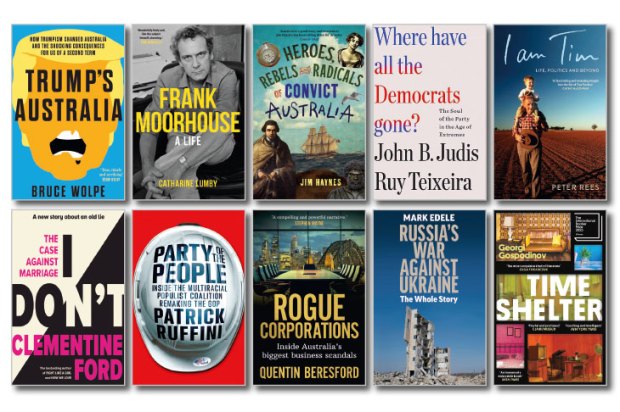Among the Western democracies there are increasing signs that things are falling apart – our governments no longer know what a ‘woman’ is, loud voices say the victims of Hamas terrorism are themselves guilty of genocide, history is being re-written under ‘de-colonisation’, societies are being divided along racial and class lines, reliable power is being shut down and replaced by weather-dependent uncertainty. The list could go on.
What has caused this? Socialism? A corruption of capitalism? A diseased mixture of the two? No. As I’ve argued before in these pages we have been taken over (by stealth) by a system I call ‘managerialism’. The management class is now in control.
They shift effortlessly between major corporations and bureaucratic institutions. They’ll be a senior advisor or consultant to government today, and tomorrow they’ll be chairing a global corporation. They turn up running major sporting codes, universities and powerful media outlets.
They see themselves as a ‘meritocracy’ – as ‘the smartest guys in the room’ – who should be telling dumb old us how to run our lives (and taking our money from us, because they can spend it better).
Seamus Bruner believes he has unmasked the puppet masters behind this all-powerful management class. The strings are being pulled, he says, by a smallish group of people who have so much money they can control almost anything.
If it suits their purposes to persuade us (or at least many of us) that the world is boiling in a climate catastrophe, then that is what they’ll do. If they see an advantage in persuading our politicians to panic over Covid-19 and take away personal freedoms, then that is what will happen.
Chapter by chapter Bruner takes us through the manipulations and manoeuvrings of Bill Gates, George Soros, Mark Zuckerberg, Jeff Bezos, the Rockefellers and others. And behind them all he sees the ultimate manipulator (the puppet master to the puppet masters) – Klaus Schwab and the dark shadow emanating from the Swiss resort town of Davos with its World Economic Forum (where these ‘controligarchs’ gather to network and scheme).
Bruner is director of research at the wonderfully named Government Accountability Institute in the United States. And just when readers might be tempted to think the story he lays out is some sort of panicky conspiracy theory they will encounter seventy-two pages of detailed end-notes, filled with supporting citations.
At one level he is trying to answer the question: why is Marxism marching triumphantly through our institutions? Is it just because of the ‘fifth column’ movement inspired by the Frankfurt School, and its thinkers and writers such as Herbert Marcuse and others? Or is something else going on?
In the collapse of the Soviet empire the West saw that Marxism was a failure: Marxist politics enslaves people and Marxist economics impoverishes people. So why is the radical left so successful in persuading the liberal democracies that Karl Marx was right, and that life consists of the oppressors and the oppressed?
Bruner agues that a management class of billionaires and bureaucrats has created an unholy alliance by co-opting leftist politicians and mobilising grassroots activists. And what they have done so far, he warns, might just be the beginning. By searching diligently through every document to ever come out of Davos, Bruner seeks to show that this movement is just gathering steam and is pushing ahead with ever bolder plans.
For instance, he argues that Wall Street titans, such as BlackRock, are working hand-in-glove with central banks around the world to ‘de-bank’ their opposition by seizing control of our currency and ‘digitising’ it – meaning they can track our every move and control our spending. What happened to Nigel Farage in the UK is, he says, just the beginning of the control they will be able to exercise over us. And without money, what can we do?
I am always doubtful of anything that might begin to smell like a ‘conspiracy theory.’ The great Sir Karl Popper argued that no conspiracy can ever (ultimately) work, since the bigger it gets the more people know about it, and the more people who know, the likelier it is that at least one of them will spill the beans. And this, Bruner says, is a conspiracy on the grandest scale.
But if only very few people see the big picture, and most enthusiastic supporters of these schemes remain as mere cogs in a larger mechanism, might an elaborate conspiracy work? If the ‘puppet masters’ are billionaires might there be so much money, speaking so loudly, that no other message gets a hearing?
Might it all be true? Might there be advisors in the shadows telling governments what to do?
We still don’t know what advice made the Albanese government decide to stop supporting Ukraine (‘Don’t give them Taipans, don’t give them Bushmasters’). And when the advice is hidden and the explanations unconvincingly muddled, what should we believe? We are not told why it is environmentally sound to destroy the landscape with hectare upon hectare of solar panels and wind turbines. We are puzzled by a dwindling defence budget making us increasingly powerless. What is really going on?
Is there a grand scheme flowing out of Davos undermining the freedoms of the world’s liberal democracies? Controligarchs by Seamus Bruner is worth reading to explore that question. You may or may not be convinced, but I can guarantee that the little grey cells will be ‘given furiously to think’ (as Poirot would put it). And that is always a good thing.
Got something to add? Join the discussion and comment below.
Get 10 issues for just $10
Subscribe to The Spectator Australia today for the next 10 magazine issues, plus full online access, for just $10.
You might disagree with half of it, but you’ll enjoy reading all of it. Try your first month for free, then just $2 a week for the remainder of your first year.














Comments
Don't miss out
Join the conversation with other Spectator Australia readers. Subscribe to leave a comment.
SUBSCRIBEAlready a subscriber? Log in